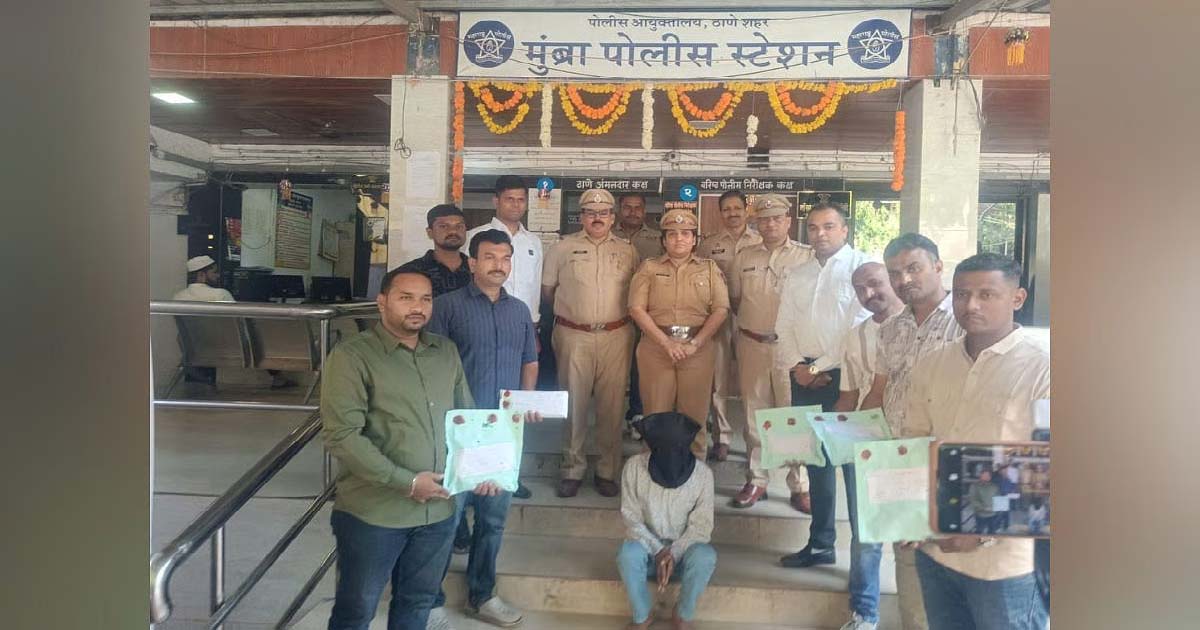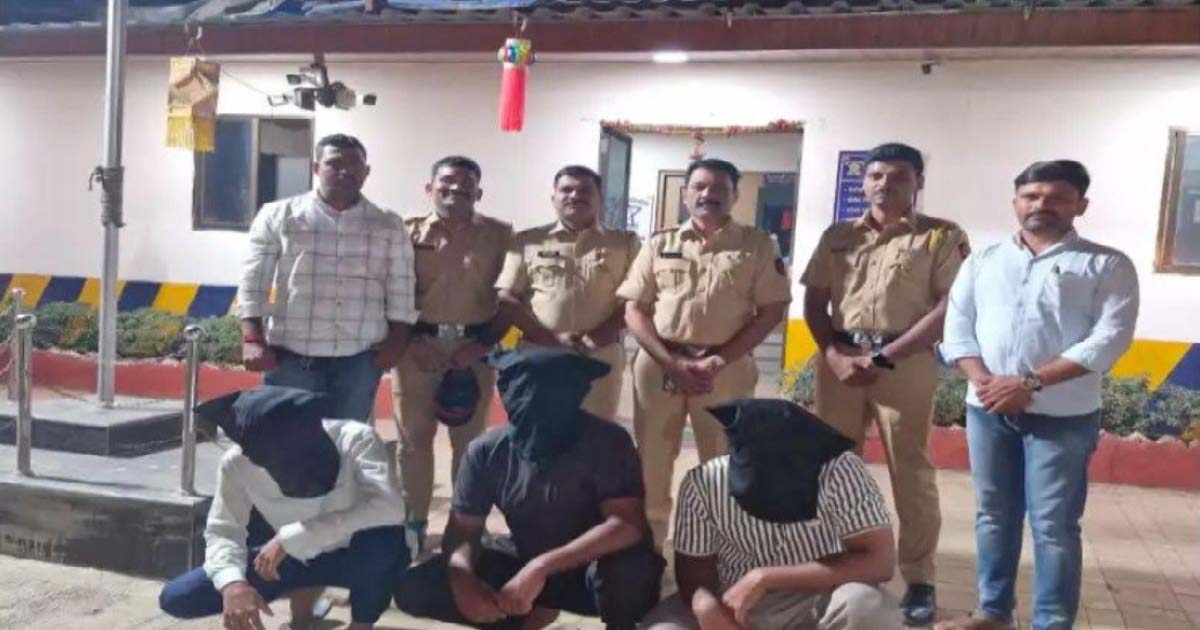Crime
Four held for duping job aspirants of Rs 3 cr in TN

The Tamil Nadu police arrested four people, including a woman, for duping more than 100 people on the pretext of providing government jobs.
Renuka(48) of Nanmangalam, Gandhi(54) of Saidapet, Mohanraj(38) and Rajendran(33) of Teynampet were arrested on Sunday by the Central Crime Branch of the Tamil Nadu police. The arrested were remanded in judicial custody.
Police said that Renuka, the kingpin of the gang, had created a fake identity card as a Government officer and cheated people by showing it. The gang had employed agents across the state who contacted the job aspirants and took them to the gang which fleeced them.
The victims were promised government jobs in all departments including PWD, school education, government hospitals, and government secretariat. The gang conducted interviews outside the government departments and later took the candidates to Kilpauk Medical College Hospital for a check-up.
Few members of the gang would take the “outpatient” slips in the name of the job aspirant at the hospital and the candidate would be taken inside for a medical check-up. Police said that the hospital staff was not involved in this and conducted the health check-up as their duty. Police said that a few days after the medical check-up, the gang issues fake posting orders to the aspirants.
The gang members, especially Renuka and Mohanraj, would take photographs of them with the VIPs to convince the job aspirants that they are close to them. Police said that money in the range of Rs 50,000 to 3 lakhs was taken from the potential aspirants.
Police team headed by Assistant Commissioner, Surendran and Inspector Kalarani arrested the four and froze ten bank accounts belonging to them. A car, two bikes, and Rs 40 lakh worth of property documents were seized from them.
Inspector Kalarani, while speaking to IANS, said: “I don’t know how people are falling into traps set by such cheats. Both Renuka and Mohanraj were arrested earlier in similar job cheating cases in 2018 at Pallikaranai and the gang according to our information has been operating since 2014.”
She said that police is conducting several awareness programmes across the state warning people not to fall into the trap of job racketeers.
Crime
Thane NDPS Wing Busts Drug Racket; Over 2.2 Kg Hashish Worth ₹1.10 Crore Seized In Mumbra, 1 Accused Arrested

Thane, Dec 06: Thane City’s NDPS branch has achieved a major success. Under an on-ground operation, the police have exposed an active gang selling narcotic substances. In this action, the police have recovered approximately 02 kg 201 grams of hashish (charas), the market value of which is estimated to be one crore ten lakh sixty-five thousand rupees.
This operation was led by Senior Police Inspector Nitin Shinde. His team included officers and personnel from the crime branch, who carried out this action based on secret information.
Police had received information that some individuals were selling hashish and other intoxicating substances in the Mumbra area. Following this, the team laid a trap, cordoned off, and caught the suspect in the Bandewadi area. A large quantity of hashish was recovered from his possession upon search.
The suspected accused has been identified as Moin Khan, alias Hasrat Ali Siddiqui. Preliminary interrogation revealed that he used to illegally procure hashish from Jammu and Kashmir and sell it in Thane, Mumbai, and surrounding areas. The accused already has several serious crimes registered against him.
In this regard, Mumbra Police has registered a case under NDPS Act 20(a)(i)(b), 29, and further investigation is underway. The police are also trying to find out who else is involved in this network and how far this hashish supply chain extends.
Crime
Palghar: Vasai-Virar Police Nab Gang Stealing Mobile Tower Batteries; ₹6 Lakh Worth Goods Recovered

Vasai: A gang specializing in stealing mobile tower batteries has become active in the Vasai-Virar region. The Crime Detection Branch team of the Pelhar Police has successfully arrested members of this gang. Stolen goods worth ₹6 lakhs have been confiscated from them.
While incidents of house burglaries, mobile thefts, vehicle thefts, and chain snatching are occurring in Vasai-Virar, the area is now seeing cases of theft of mobile tower batteries installed for networking purposes.
Recently, twenty-four batteries belonging to the Indus Company’s mobile phone tower, valued at ₹50,000, were stolen by unknown thieves from the Arshad Compound area within the jurisdiction of the Pelhar Police Station. A case was filed at the police station regarding this incident.
Taking the seriousness of the crime into account, Senior Police Inspector Sachin Kamble instructed the Crime Detection Branch team to investigate the matter.
Accordingly, the detection team, led by Assistant Police Inspector Ramesh Waghchaure, Police Sub-Inspector Tukaram Bhople, and their team, started the investigation. It was discovered that a pickup Bolero vehicle was being used for the crimes and that the accused were employed at ARC Company (related to mobile phone towers).
Police tracked down and arrested three individuals: Aurangzeb Sarwar Ansari (19), Parvez Ghulam Rasul Shah (24), and Rafiq Aminsab Sheikh (38). Police reported seizing property worth ₹6 lakh 12 thousand from them.
The operation was conducted by the team comprising Senior Police Inspector Sachin Kamble, Police Inspector (Crime) Shivaji Patil, Crime Detection Team Assistant Police Inspector Ramesh Waghchaure, Police Sub-Inspector Tukaram Bhople, Faujdar Yogesh Deshmukh, Police Constables Tanaji Chavan, Valmik Patil, Abhijit Nevare, Ravi Wankhede, Ashok Parjane, Anil Waghmare, Wasim Sheikh, Amol Masse, and others.
Crime
One killed, five injured in Trinamool factional clash in Birbhum

Kolkata, Dec 6: A Trinamool Congress leader was killed, and five others were seriously injured in a violent clash between two factions of the ruling party in West Bengal’s Birbhum district, police said on Saturday.
The incident occurred in the Nanoor area of Birbhum district late on Friday night. The deceased Trinamool leader, who was beaten to death, has been identified as Rashbehari Sardar alias Dodan (50).
According to police, the deceased is known to be a follower of Trinamool Birbhum Zilla Parishad president Faizul Haque alias Kajal Shaikh. The injured were taken to Mangalkot Block Hospital in East Burdwan district. The body of the deceased Trinamool leader has been taken to Mangalkot Sub-divisional Hospital for post-mortem examination.
The clash broke out while villagers were gathered at the Natmandir in Patichhara village in Nanoor during Nabanna festivities. As the group was chatting, another group allegedly launched an unprovoked assault, leading to the fatal attack.
Those who carried out the attack are known to be followers of former Zilla Parishad corporator Abdul Karim Khan, who is close to Trinamool Congress strongman and former Birbhum district president Anubrata Mondal.
The Trinamool factional conflict ahead of the upcoming 2026 state Assembly elections is a matter of concern for the party leadership, sources in the Trinamool Congress said.
Following the incident, there has been widespread tension in the area. A large police force, including a combat force, has been patrolling the villages to ease the tension. Locals alleged that the death was due to Trinamool factional conflict. However, no top leader of the Birbhum district Trinamool Congress has officially spoken about the incident so far.
“One person was killed, and five others were injured in a clash last night. The injured are being treated at a hospital. Some of them have serious head injuries. An investigation has started. Extensive patrolling is being conducted to prevent any further escalation,” said a senior officer of the Birbhum district police.
-

 Crime3 years ago
Crime3 years agoClass 10 student jumps to death in Jaipur
-

 Maharashtra1 year ago
Maharashtra1 year agoMumbai Local Train Update: Central Railway’s New Timetable Comes Into Effect; Check Full List Of Revised Timings & Stations
-

 Maharashtra1 year ago
Maharashtra1 year agoMumbai To Go Toll-Free Tonight! Maharashtra Govt Announces Complete Toll Waiver For Light Motor Vehicles At All 5 Entry Points Of City
-

 Maharashtra1 year ago
Maharashtra1 year agoFalse photo of Imtiaz Jaleel’s rally, exposing the fooling conspiracy
-

 National News1 year ago
National News1 year agoMinistry of Railways rolls out Special Drive 4.0 with focus on digitisation, cleanliness, inclusiveness and grievance redressal
-

 Maharashtra1 year ago
Maharashtra1 year agoMaharashtra Elections 2024: Mumbai Metro & BEST Services Extended Till Midnight On Voting Day
-

 National News1 year ago
National News1 year agoJ&K: 4 Jawans Killed, 28 Injured After Bus Carrying BSF Personnel For Poll Duty Falls Into Gorge In Budgam; Terrifying Visuals Surface
-

 Crime1 year ago
Crime1 year agoBaba Siddique Murder: Mumbai Police Unable To Get Lawrence Bishnoi Custody Due To Home Ministry Order, Says Report












